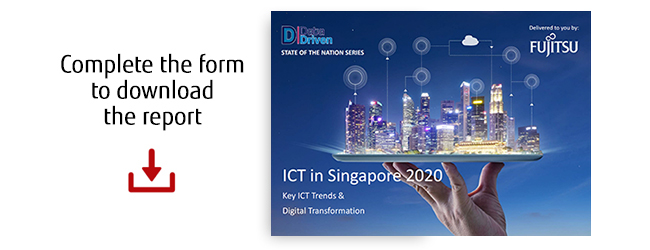
Digital transformation (DX) is a key initiative for most Singapore organizations. But it is an ill-defined term that means different things to different people. Recent research from Fujitsu sheds light on the subject.
In October 2019 Fujitsu commissioned DataDriven, an Asia/Pacific based research and advisory firm to conduct a major study of 125 ICT decision makers in Singapore.
What is Digital Transformation (DX)?
Digital technology, in all its forms, is transforming business and society. Virtually every area of human activity is being profoundly altered. The most successful people and organizations are those embracing this transformation to build new products and services based on innovative business models enabled by the many technologies that comprise the trend. That is what DX is.
There are many technologies driving this revolution, enabling levels of communication, connectivity and information sharing unimaginable a few short years ago. These technologies include cloud processing and the Internet of Things (IoT), and new ways of delivering and sharing software and services.
Another key driver is the range of technologies known collectively as Artificial Intelligence (AI), which are enabling new ways of working, new ways of analyzing data, and new ways of using existing technology. Massive advances in computing power have made possible AI technologies like machine learning, robotic process automation (RPA) and predictive data analytics. These techniques enable us to make sense of the vast amounts of information (often called ‘Big Data’) generated by the new technologies of the DX era.
DX is driving revolutionary changes, but this comes at a cost
Governments at every level are delivering their services digitally and are opening up government data to third parties to help them develop new information-based services. Electronic identity management has become commonplace. These changes are revolutionary, but they are not without cost. New technologies mean new opportunities, bad as well as well as good. In a totally connected world, Cybersecurity has become a major issue. It encompasses a range of technologies designed to protect computers and networks from unwelcome intrusion and to ensure their continued reliability.
Adoption of digital technologies in Singapore
A number of key enabling technologies are being implemented. Investment in innovative technologies such as robotics, blockchain, biometrics and 3D printing are still at relatively moderate levels, though growing quickly. Singapore organisations are also looking to DX for operational improvements in such areas as real time data analytics, predictive data and workplace innovation.
A cluster of other technologies have a moderate level of planned investment including mobility, AI and machine learning, ERP and augmented and virtual reality. There is strong investment in cloud – public, private and hybrid.
Key DX challenges
DX is not without its challenges. The survey showed that the biggest by far are aligning existing ICT systems with new digital technologies, the procurement of digital technologies and the time needed to achieve the benefits. Also important are identifying which technologies to use and the complexity of DX implementation.
To find out how Fujitsu can help your organization’s DX journey, contact us today.
To read the full research report, click the download button above.

